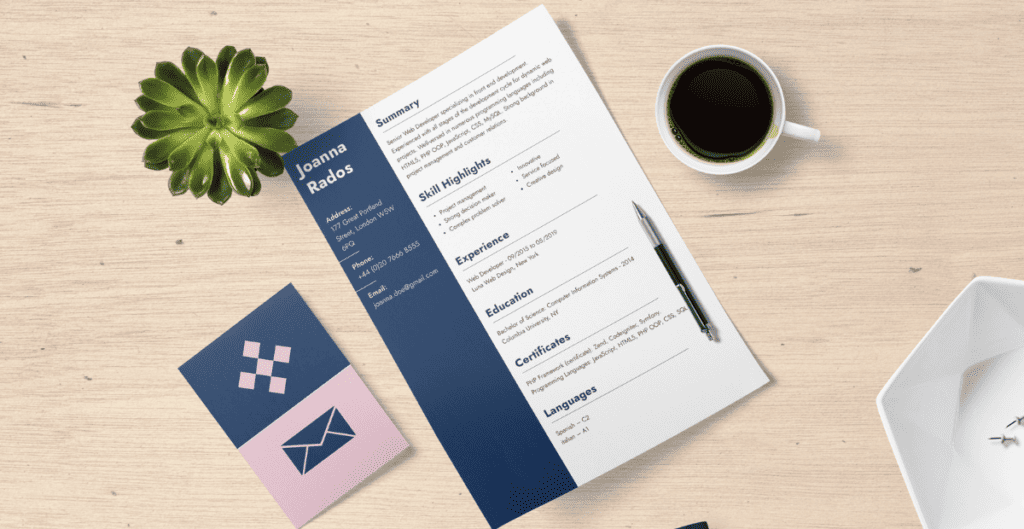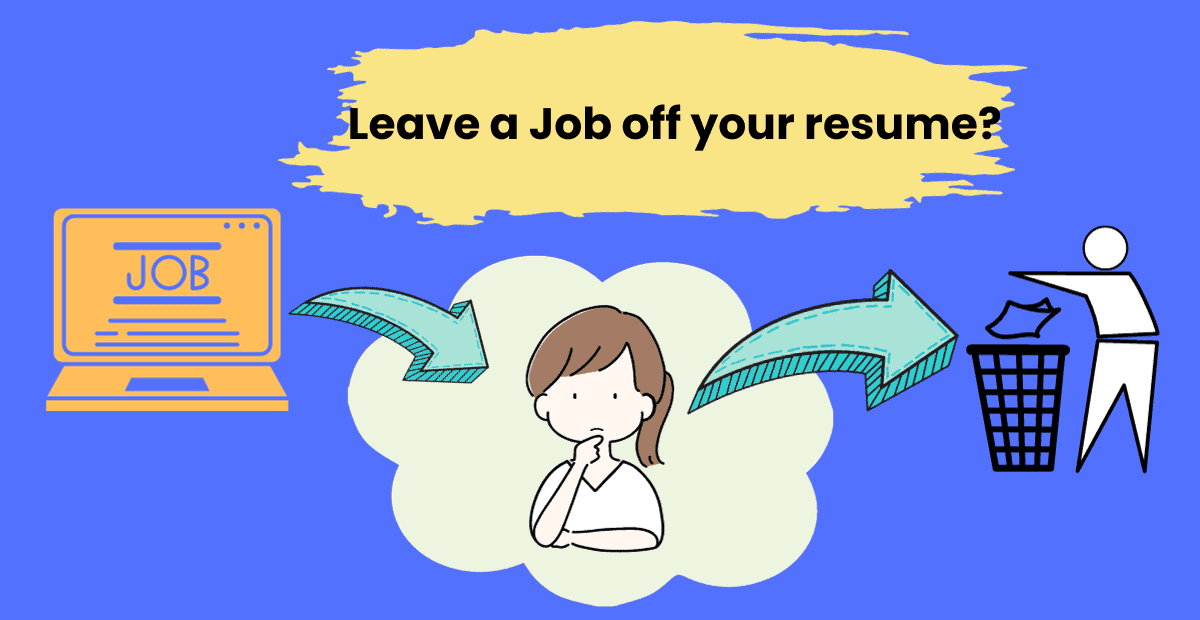Is It Ever Okay To Leave A Job Off Your Resume?

Table of Contents
Key Takeaways
- Omitting irrelevant jobs from your resume can enhance focus on pertinent skills and experiences.
- Pros of exclusion: maintains relevance, manages resume length, avoids negativity, and covers employment gaps.
- Cons include the potential perception of less experience, unexplained gaps, dishonesty concerns, and missed opportunities.
- Acceptable scenarios for exclusion: brief job stints, roles irrelevant to the current path, and very old experiences.
- Addressing employment gaps requires honesty, using a functional resume, explaining the gap, highlighting relevant activities, and expressing readiness to return to work.
1. Introduction:
Sometimes, you might need to leave a specific job off your resume. One of the most common reasons is that the job might differ from the position you’re applying for. If, for instance, your stint as a barista doesn’t bring any valuable skills or experiences to the software engineering role you’re targeting, it might be better to leave it off.
Irrelevant positions can dilute your resume’s focus, making it harder for hiring managers to see the skills and experiences that make you a good fit for the role. Another reason could be if you were only at a job for a very short time, and you feel it needs to be more valuable to your story.
However, there are also counterarguments and potential risks to consider. Let’s delve into the specifics to help you make an informed decision in different scenarios.
2. Understanding the Basics:
What Is a Resume, and What Purpose Does It Serve?
A resume is a concise, often bulleted document highlighting your professional skills, work history, and education. It is typically a potential employer or recruiter’s first impression of you. Its primary purpose is to showcase your qualifications and achievements about the job you’re applying for.
The resume should give a quick snapshot of your capabilities and how they align with the position’s requirements. It also serves as a tool to market your abilities, enabling you to stand out from other candidates. Remember, a well-crafted resume is a critical step in landing job interviews and, ultimately, the job you desire.
3. Pros and Cons: Examining the Implications of Omitting Past Jobs from Your Resume
Pros of Leaving a Job Off Your Resume
There are several positive aspects of skipping a past job from your resume.
Firstly, it allows you to maintain relevance. When applying for a specific role, your resume should be tailored and focused on the relevant skills and experiences that align with the job requirements. Including unrelated jobs may distract the employer from your essential qualifications.
Secondly, it can help manage resume length. A concise, one-page resume is typically preferred, especially for early to mid-career professionals. Leaving off less pertinent jobs allows you to keep it short and impactful.
Thirdly, it can enable you to avoid negative perceptions. If a past job ended on less-than-ideal terms or contained contentious issues, it might be better to omit it. Finally, it may assist in covering gaps in employment. If you had a short-term job that doesn’t add value to your application, leaving it off can help present a more seamless career progression.
Cons of Leaving a Job Off Your Resume
However, there are also potential drawbacks to excluding a past job from your resume.
Firstly, it could result in appearing less experienced. Any job, even those unrelated to the new role, provides transferable skills, knowledge, and experience. By taking off a job, you may appear less experienced to the potential employer.
Secondly, it could lead to unexplained employment gaps. If removing a job from your resume results in a significant gap in your employment history, it might raise questions during the interview process.
Thirdly, it could create a perception of dishonesty. If a potential employer discovers a job was omitted, they may question your honesty and integrity, which could influence your chances of securing the role. Finally, it may result in missed opportunities.
Sometimes, unrelated jobs may contain experiences and learnings relevant to the role you’re applying for, and leaving them out might cause you to miss out on demonstrating these to potential employers.
4. Specific Scenarios Where It’s Acceptable to Leave a Job off Your Resume
One scenario where it might be acceptable to take a job off is if you had a brief stint at a job, mainly if it was less than three months. Short-term jobs can raise questions about job stability, commitment, and performance.
If the job isn’t directly related to the role you’re applying for or doesn’t add significant value to your application, it might be better to exclude it. However, if the job provided valuable experience or skills, or if leaving it off results in a noticeable employment gap, you might consider including it.
Another scenario where it might be advisable to leave a job is when it is irrelevant to your current career path. If you’ve switched fields or industries and have past work experiences unrelated to the role you’re applying for, it might be best to overlook them.
This will allow you to focus on and highlight the experiences and skills most pertinent to the job. However, it’s essential to remember that transferrable skills gained in any role could still be valuable, so assess each job’s relevancy thoroughly before deciding to exclude it.
Lastly, jobs from a long time ago might also be left off. If you have a long work history, it’s expected only to include the most recent and relevant jobs. Experience over 10-15 years old can often be viewed as outdated, particularly in fast-paced industries like tech or digital marketing.
Consider leaving these roles off, especially if they aren’t directly related to the job you’re applying for. But remember, if these roles helped you develop essential transferable skills, or if they fill in employment gaps, you should include them.
It balances relevancy, skill demonstration, and a comprehensive employment history.
5. How to Handle Employment Gaps:
Addressing employment gaps can be a daunting task. Here are some tips to help you navigate this situation:
- Be Honest: Firstly, honesty is vital. Never try to cover up employment gaps by extending the dates of previous employment. This could cause problems later if an employer decides to do a background check.
- Use a Functional Resume: Consider using a functional resume. This type of resume focuses on skills rather than chronological work history and can help you highlight your relevant experience and abilities.
- Explain the Gap: If the gap is recent, it might be worth addressing in your cover letter. You can briefly explain the gap, whether for personal reasons, further education, or a career break.
- Highlight Any Relevant Activities: If, during your employment gap, you undertake any activities that helped develop your skills or are relevant to the job you’re applying for, make sure to include these. This could be volunteer work, courses, freelance work, or even personal projects.
- Show You’re Ready to Return to Work: Finally, conveying that you’re now ready and excited to return to work is essential. You can do this by demonstrating your commitment to keeping up with industry trends during your period of unemployment. Remember, every job seeker’s journey is unique, and employers understand that. Be confident in presenting yours.
6. Conclusion:
To summarize and conclude on this topic;
- Deciding to omit jobs from your resume is a personal choice based on your career circumstances.
- For those with extensive experience, skipping early roles helps maintain a concise, focused resume on relevant experiences.
- Address employment gaps positively, emphasizing skills acquired during unemployment.
- Express enthusiasm for returning to the workforce, prioritizing honesty and a future-focused perspective in managing your resume history.
7. Frequently Asked Question
Q: How should I handle a job or experience that didn’t end on good terms?
A: When addressing a previous harmful job or experience, honesty and professionalism are essential. Take responsibility for your actions and discuss what you learned. Avoid speaking negatively about former employers or colleagues, as it reflects poorly. Please focus on the skills and knowledge gained and how they shaped you professionally. Stay positive and maintain a professional demeanor when discussing past experiences, good or bad.
Q: How do I handle job hopping on my resume?
A: Job hopping can raise concerns for potential employers. On your resume, provide clear explanations for each transition. If leaving was beyond your control (e.g., company closures or layoffs), mention that. Emphasize skills and experiences from each job to showcase professional growth. Discuss job changes in detail in interviews, demonstrating commitment and dedication to long-term positions. Be honest and transparent, and focus on positive outcomes.
Q: How do I handle discussing salary expectations?
A: When discussing salary expectations, it’s essential to do your research and clearly understand the industry standards for the position you are applying for. This will help you provide a realistic range of salary expectations. Additionally, it’s essential to consider location, company size, and job responsibilities when determining your ideal salary. Remember to be confident but also open to negotiation during the interview.
Q: Is it ever okay to leave a job off your resume?
A: Certain circumstances exist, such as if the job was short-term or irrelevant to the position you are applying for.
Q: Should I include every job on my resume?
A: You should include the jobs relevant to the position you are applying for and showcase your skills and experience.
Q: Can leaving a job off my resume raise concerns for potential employers?
A: Omitting a job from your resume may raise questions from potential employers, especially if there are gaps in your work history. It’s essential to consider the potential concerns and be prepared to address them if asked.
Q: Do I need to include my first job on my resume?
A: Including every job you’ve ever held on your resume is unnecessary. Focus on listing the most relevant jobs to your current career and highlight your accomplishments and skills.
Q: How far back should I go in listing my work history on my resume?
A: Generally, it’s recommended to include your work history from the past 10-15 years. However, it can also be included if you have a highly relevant older experience.
Q: Are there legal implications to leaving a job off my resume?
A: Your resume is not a legal document, so you must not include every job you’ve held. However, it’s essential to be truthful and accurate in representing your work history.
Q: What are some reasons to leave a job off my resume?
A: Some reasons might include if it was a short-term position, not relevant to the job you’re applying for, or if it happened long ago and is not as impactful for your current career.
Q: How should I address leaving a job off my resume in an interview?
A: If asked about a gap in your work history or why a specific job is not on your resume, be honest and explain clearly and professionally. Focus on emphasizing the relevant experience and skills that make you a strong candidate.
Q: Can leaving a job off my resume protect against age discrimination?
A: While there is no guarantee, leaving off older, less relevant positions from your resume can help reduce the risk of facing age discrimination during the hiring process. Focus on highlighting your most recent and relevant work experience.
Q: Should I include a job on my resume if it wasn’t a positive experience?
A: If a previous job wasn’t a positive experience and is irrelevant to the position you’re applying for, you may leave it off your resume. Focus on highlighting your achievements and experiences that align with the new position you are seeking.
